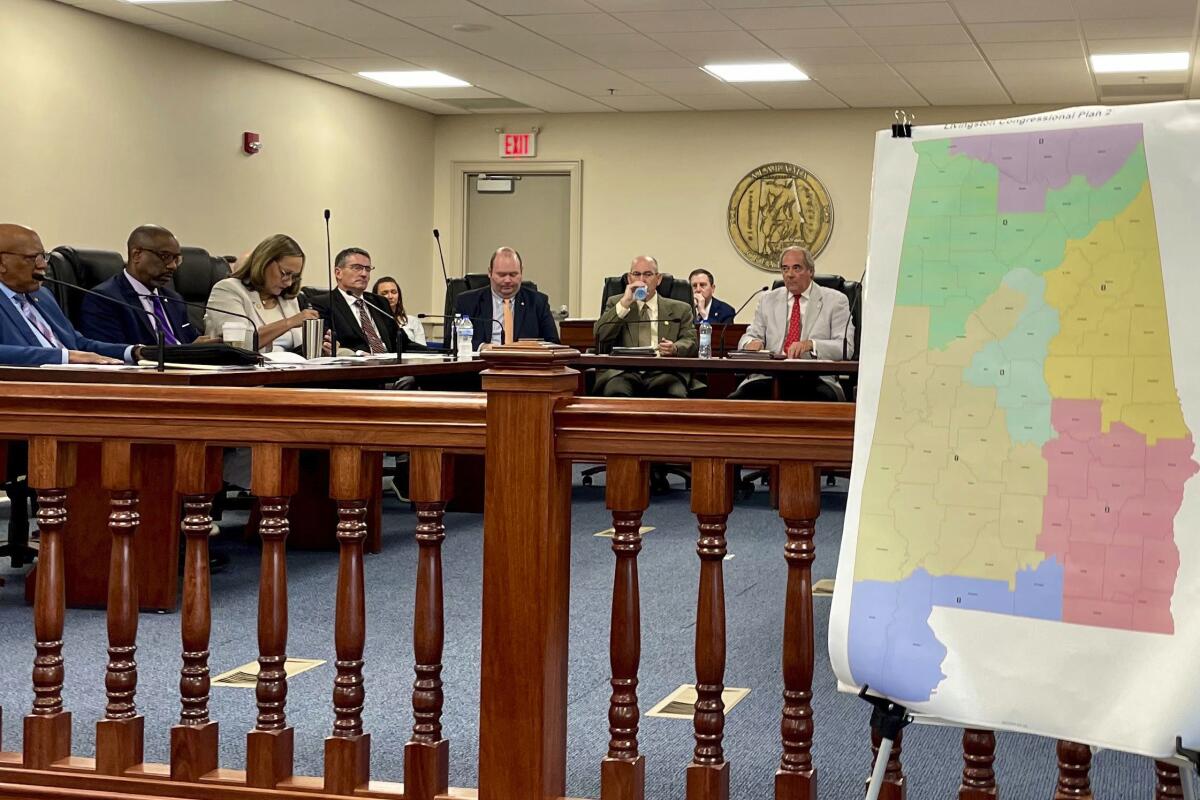Alabama refuses to create second majority-Black congressional district in defiance of Supreme Court

- Share via
MONTGOMERY, Ala. — Alabama has refused to create a second majority-Black congressional district, a move that could defy a recent order from the U.S. Supreme Court to give minority voters a greater voice and trigger a renewed battle over the state’s political map.
Lawmakers in the Republican-dominated House and Senate instead passed a plan Friday that would increase the percentage of Black voters from about 31% to 40% in the state’s 2nd District. The map was a compromise between plans that had percentages of 42% and 38% for the southeast Alabama district. GOP Gov. Kay Ivey quickly signed it.
State lawmakers faced a deadline to adopt new district lines after the Supreme Court in June upheld a three-judge panel’s finding that the current state map — with one majority-Black district out of seven in a state that is 27% Black — probably violates the federal Voting Rights Act.
Voting rights advocates and Black lawmakers said the plan invoked the state’s Jim Crow history of treating Black voters unfairly.
Former U.S. Atty. Gen. Eric H. Holder Jr., chairman of the National Democratic Redistricting Committee, said the map, “and the Republican politicians who supported it, would make George Wallace proud,” referring to the segregationist former Alabama governor.
“It arrogantly defies a very conservative United States Supreme Court decision ... from just weeks ago,” Holder said in a statement.
Tens of thousands of protesters have marched on the main highway into Jerusalem in a last-ditch show of force aimed at blocking Prime Minister Benjamin Netanyahu’s contentious judicial overhaul plan.
Republicans argued that their proposal complies with the directive to create a second district where Black voters could influence the outcome of congressional elections. Opponents said it flouted a directive from the panel to create a second majority-Black district or “something quite close to it” so that Black voters “have an opportunity to elect a representative of their choice.”
The 140-seat Alabama Legislature has 33 Black lawmakers. All but one are Democrats.
“There’s no opportunity there for anybody other than a white Republican to win that district. It will never, ever elect a Democrat. They won’t elect a Black. They won’t elect a minority,” said Sen. Rodger Smitherman, a Democrat from Birmingham.
Republicans have been reluctant to create a Democratic-leaning district and are engaging in a high-stakes wager that the panel will accept their proposal or that the state will prevail in a second round of appeals. Republicans argued that the map meets the court’s directive and draws compact districts that comply with redistricting guidelines.
“If you think about where we were, the Supreme Court ruling was 5 to 4, so there’s just one judge that needed to see something different. And I think the movement that we have and what we’ve come to compromise on today gives us a good shot,” House Speaker Nathaniel Ledbetter said.
Republican Senate President Pro Tem Greg Reed said he believed the changes to the district make it a so-called opportunity district.
“I’m confident that we’ve done a good job. It will be up to the courts to decide whether they agree,” Reed said.
The debate in Alabama is being closely watched across the nation, and could be mirrored in fights in Louisiana, Georgia, Texas and other states.
A three-judge appellate court panel ruled in 2022 that the current legislative map probably violates the federal Voting Rights Act and said any map should include two districts where “Black voters either comprise a voting-age majority” or something close. The Supreme Court concurred.
Now that the plan has passed, the fight will shift back to the federal court to debate whether Alabama’s congressional districts comply with federal law and offer a fair opportunity to Black voters and candidates in a political landscape dominated by white Republicans.
Black Alabama lawmakers say it’s crucial that their constituents have a better chance of electing their choices.
“I have people in my district saying their vote doesn’t count, and I understand why they say that,” Rep. Thomas Jackson, a Thomasville Democrat, said during debate Friday.
“The person they want to elect can never get elected because they are in the minority all the time.”
Black lawmakers disputed that the changes to the 2nd District, an area with deep ties to agriculture and home to military bases, would easily become a swing district.
They speculated that state Republicans were seeking to mount another challenge to federal voting law.
“This is designed to protect a few people and ultimately to finish off the Voting Rights Act,” said Rep. Chris England, a Democratic lawmaker from Tuscaloosa.
An analysis by the Associated Press, using redistricting software, shows that the 2nd District proposed Friday has mostly voted for Republicans in recent statewide elections. Then-President Trump won the district by nearly 10 percentage points in his 2020 reelection bid.
Experts have said the GOP proposals fall short of what the Supreme Court said last month is required.
“They have pretended as though the court didn’t say what it said,” said Kareem Crayton, senior director for voting and representation at New York University’s Brennan Center for Justice, which filed a brief supporting the plaintiffs before the Supreme Court.
More to Read
Sign up for Essential California
The most important California stories and recommendations in your inbox every morning.
You may occasionally receive promotional content from the Los Angeles Times.











